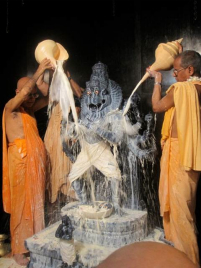Mayapur Academy of Deity Worship Will Expand to Second Facility
By Madhava Smullen | Apr 03, 2011

ISKCON’s headquarters, Mayapur, West Bengal, India — The Mayapur Academy, which aims to train brahmanas with a focus on Deity worship, looks set to add a new building to its educational campus to accommodate its rapid growth.
In an early March meeting of the Mayapur Administrative Council, a proposal for the school to occupy three floors of a new building about to be constructed was approved.
The Academy currently finds its home on the 5,000-square-foot second floor of ISKCON Mayapur’s Chaitanya Bhavan building, which includes four classrooms, an office, a store room and a library that stocks Srila Prabhupada’s books in 54 languages.
The new building will be erected fifty yards from the Chaitanya Bhavan, and its three purpose-built floors for the Mayapur Academy will include two floors of classrooms and offices, and one floor for toilets and a second library. Its full floor space will be 8,400 square feet, giving the Academy a total of 13,400 square feet across two buildings—one of which will accommodate classes for men, and the other for women.
“With forty-two students last year up from thirty-two the year before, we are at capacity—but we look set to keep growing,” says Director Nrsimha Kavacha Dasa. “In addition, our library is constantly expanding and we need more space to house the books. So we hope to double our capacity by dividing our classes into men’s and women’s, and having them in separate classrooms. The cooking course, the Deity dressing course and the samskaras course are already segregated.”
The Mayapur Academy has evolved from the seven-day Deity worship courses that Nrsimha Kavacha and devoted Mayapur pujari (priest) Jananivasa Dasa began teaching in 1999. Offered each year before the Gaura Purnima festival, they gradually developed into a three-week, two-part course in 2007.
“The second level course was a big step forward for us,” Nrsimha Kavacha says. “Up until that time it had mostly been theory and demonstrations. Now with the second level course not only did the devotees get hands-on experience in the various rituals of Deity worship, but they also got feedback on their abilities from the most experienced pujaris in ISKCON.”
Nrismha Kavacha describes how, after teaching the two-part course for the second time in 2007, he went to see Jananivasa Dasa in his room to get his feedback.
“He asked me, ‘So when do we start?’ Puzzled, I asked, ‘Start what?’ He replied, ‘When do we start the school?’”
After that fateful day, everything fell into place—they were offered space in a building that was being expanded, a design was drafted, and funds somehow became available.
In December 2007, the Mayapur Academy officially opened its doors.
The school began offering two major courses, which are still running: one, a Bengali language course held during the rainy season, and the second an English language diploma course which runs fourteen weeks from the beginning of November until Nityananda Trayodasi each year.
The Bengali language course is attended by fifty to seventy-five devotees each year, while the nineteen students who attended the first English language diploma course in 2007 have since grown to forty-two in the 2010 to 2011 semester. Students hail from many countries around the world and are of all ages and backgrounds.
There are also a range of short seminars to give older students hands-on experience in Deity worship and other practical tasks related to it.
“We have courses on Deity dressing, cooking for Deities, temple worship, Deity festivals, Tulasi care, flower arranging, samskaras, brahminical culture and ethics, and dressmaking,” says Nrsimha Kavacha. “We even have a Chinese language cooking course facilitated by Rasesvari Dasi, a Mayapur resident. We also have many pre-Gaura Purnima courses for devotees visiting Mayapur for the Gaura Purnima festival.”
All these courses have a very practical focus: for the cooking course, there are eight commercial stoves for the students to use; for the dressing course, there are resin models and heads for turban practice, and for learning temple worship there are brass Deities the devotees can worship as well as an abundance of worship paraphernalia. There are also embroidery tables for use in learning dress-making, while during the samskaras course, devotees get practical experience of conducting fire yajnas.
“Most of our courses offer a certificate for devotees who successfully complete them,” says Nrsimha Kavacha. “The various certificate level courses have credit ratings, and in order to receive a diploma a devotee must achieve at least forty-eight credit points. Their sadhana, or personal devotional practice, during the course is also assessed.”
Graduates are extremely inspired by the Academy’s courses, finding that they benefit them and the temples they serve at immensely.
“In the four months we spent in Mayapur, we got to really imbibe what it means to be the Lord’s Pujari,” says ISKCON London Head Pujari Murli Manohara Dasa. “Since returning to our temple we have made marked improvements in the quality of our worship. We now have a much clearer understanding of the standards that Srila Prabhupada expected. We have personally taught devotees about ‘The principles and elements’ of the art and continue to teach devotees in the method of worshiping Gaura and Nitai. As Head Pujari it was an invaluable experience—an experience that I continue to reflect on, and put to use on a daily basis.”
With its newly expanded space, the Mayapur Academy hopes to eventually have 200 students at a time, and present a range of courses focusing on brahminical skils and values.
“Our goal is to have a fully trained and qualified brahmana in every temple in ISKCON,” Nrsimha Kavacha concludes.
For more information, please visit the sites http://www.deityworship.com and http://www.mayapuracademy.org, the blog http://mayapuracademy.wordpress.com, or the Facebook page http://www.facebook.com/pages/Mayapur-Academy















